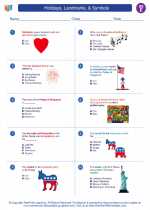National Curriculum Standards for Social Studies (NCSS)
TIME, CONTINUITY, AND CHANGE
SOCIAL STUDIES PROGRAMS SHOULD INCLUDE EXPERIENCES THAT PROVIDE FOR THE STUDY OF THE PAST AND ITS LEGACY.
KNOWLEDGE - Learners will understand:
The history of democratic ideals and principles, and how they are represented in documents, artifacts and symbols.
POWER, AUTHORITY, AND GOVERNANCE
SOCIAL STUDIES PROGRAMS SHOULD INCLUDE EXPERIENCES THAT PROVIDE FOR THE STUDY OF HOW PEOPLE CREATE, INTERACT WITH, AND CHANGE STRUCTURES OF POWER, AUTHORITY, AND GOVERNANCE.
KNOWLEDGE - Learners will understand:
Rights are guaranteed in the U.S. Constitution, the supreme law of the land.
PROCESSES - Learners will be able to:
Examine persistent issues involving the rights of individuals and groups in relation to the general welfare.
Compare and analyze the ways in which groups and nations respond to the richness of unity and diversity, as well as tensions and conflicts associated with unity and diversity.
CIVIC IDEALS AND PRACTICES
SOCIAL STUDIES PROGRAMS SHOULD INCLUDE EXPERIENCES THAT PROVIDE FOR THE STUDY OF THE IDEALS, PRINCIPLES, AND PRACTICES OF CITIZENSHIP IN A DEMOCRATIC REPUBLIC.
KNOWLEDGE - Learners will understand:
Concepts and ideals such as: individual dignity, liberty, justice, equality, individual rights, responsibility, majority and minority rights, and civil dissent.
Key practices involving the rights and responsibilities of citizenship and the exercise of citizenship (e.g., respecting the rule of law and due process, voting, serving on a jury, researching issues, making informed judgments, expressing views on issues, and collaborating with others to take civic action).
National Standards for Civics and Government (NSCG)
What are the foundations of the American political system? What is the American idea of constitutional government?
The American idea of constitutional government. Students should be able to explain the essential ideas of American constitutional government. To achieve this standard, students should be able to
Evaluate, take, and defend positions on current issues involving constitutional protection of individual rights, such as
Limits on speech, e.g., ''hate speech,'' advertising, libel and slander, ''fighting words''
Cruel and unusual punishment, e.g., death penalty
Privacy, e.g., fingerprinting of children, national identification cards, wiretapping, DNA banks
What are the foundations of the American political system? What values and principles are basic to American constitutional democracy?
Conflicts among values and principles in American political and social life. Students should be able to evaluate, take, and defend positions on issues in which fundamental values and principles are in conflict. To achieve this standard, students should be able to
Explain why people may agree on values or principles in the abstract but disagree when they are applied to specific issues
Agreement on the value of freedom of expression but disagreement about the extent to which expression of unpopular and offensive views should be tolerated, e.g., neo-Nazi demonstrations, racial slurs, profanity, lyrics that advocate violence
Disparities between ideals and reality in American political and social life. Students should be able to evaluate, take, and defend positions on issues concerning ways and means to reduce disparities between American ideals and realities. To achieve this standard, students should be able to
Explain, using historical and contemporary examples, discrepancies between American ideals and the realities of political and social life in the United States, e.g., the ideal of equal justice for all and the reality that the poor may not have equal access to the judicial system.
Describe historical and contemporary efforts to reduce discrepancies between ideals and the reality of American public life, e.g., abolition, suffrage, civil rights, and environmental protection movements
How does the government established by the constitution embody the purposes, values, and principles of American democracy? How does the American political system provide for choice and opportunities for participation?
Political parties, campaigns, and elections. Students should be able to explain how political parties, campaigns, and elections provide opportunities for citizens to participate in the political process. To achieve this standard, students should be able to
Describe the role of political parties
What are the roles of the citizen in American democracy? What is citizenship?
The meaning of citizenship. Students should be able to explain the meaning of American citizenship. To achieve this standard, students should be able to
Explain the important characteristics of citizenship in the United States. Specifically, citizenship
Confers certain rights and privileges, e.g., the right to vote, to hold public office, to serve on juries
What are the roles of the citizen in American democracy? What are the rights of citizens?
Personal rights. Students should be able to evaluate, take, and defend positions on issues involving personal rights. To achieve this standard, students should be able to
Identify personal rights, e.g., freedom of conscience, freedom to marry whom one chooses, to have children, to associate with whomever one pleases, to live where one chooses, to travel freely, to emigrate
Explain the importance to the individual and to society of such personal rights as
Freedom of expression and association
Freedom of movement and residence
Privacy
Identify and evaluate contemporary issues that involve personal rights, e.g., restricting membership in private organizations, school prayer, dress codes, curfews, sexual harassment, the right to refuse medical care
Political rights. Students should be able to evaluate, take, and defend positions on issues involving political rights. To achieve this standard, students should be able to
Identify political rights, e.g., the right to vote, petition, assembly, freedom of press
Explain the meaning of political rights as distinguished from personal rights, e.g., the right of free speech for political discussion as distinct from the right of free speech to express personal tastes and interests, the right to register to vote as distinct from the right to live where one chooses
Identify major statements of political rights in documents such as the Declaration of Independence, United States Constitution, including the Bill of Rights, state constitutions, and civil rights legislation
Explain the importance to the individual and society of such political rights as
Freedom of speech, press, assembly, and petition
Identify and evaluate contemporary issues that involve political rights, e.g., hate speech, fair trial, free press
Economic rights. Students should be able to evaluate, take, and defend positions on issues involving economic rights. To achieve this standard, students should be able to
Explain the importance to the individual and to society of such economic rights as the right to
Choose one's work, change employment
Copyright and patent
Enter into lawful contracts
Identify and evaluate contemporary issues regarding economic rights, e.g., employment, welfare, social security, minimum wage, health care, equal pay for equal work, freedom of contract
Scope and limits of rights. Students should be able to evaluate, take, and defend positions on issues regarding the proper scope and limits of rights. To achieve this standard, students should be able to
Explain what is meant by the ''scope and limits'' of a right, e.g., the scope of one's right to free speech in the United States is extensive and protects almost all forms of political expression. The right to free speech, however, can be limited if and when that speech seriously harms or endangers others
Explain the argument that all rights have limits
Explain criteria commonly used in determining what limits should be placed on specific rights, e.g.,
Clear and present danger rule
Compelling government interest test
National security
Libel or slander
Public safety
Equal opportunity
Identify and evaluate positions on a contemporary conflict between rights and other social values and interests, e.g., the right of the public to know what their government is doing versus the need for national security, the right to property versus the protection of the environment
What are the roles of the citizen in American democracy? How can citizens take part in civic life?
Forms of political participation. Students should be able to describe the means by which Americans can monitor and influence politics and government. To achieve this standard, students should be able to
Explain how Americans can use the following means to monitor and influence politics and government at local, state, and national levels
Joining political parties, interest groups, and other organizations that attempt to influence public policy and elections
Describe historical and current examples of citizen movements seeking to promote individual rights and the common good, e.g., abolition, suffrage, labor and civil rights movements
Political leadership and public service. Students should be able to explain the importance of political leadership and public service in a constitutional democracy. To achieve this standard, students should be able to
Evaluate the role of ''the loyal opposition'' in a constitutional democracy
National Center for History in Schools (NCHS)
Historical Thinking Standards
Historical Comprehension
Reconstruct the literal meaning of a historical passage.
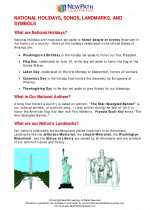
 Worksheet/Answer key
Worksheet/Answer key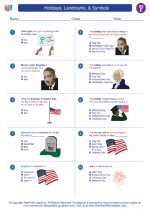
 Worksheet/Answer key
Worksheet/Answer key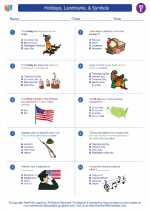
 Worksheet/Answer key
Worksheet/Answer key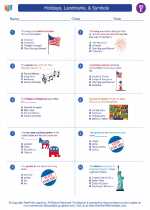
 Worksheet/Answer key
Worksheet/Answer key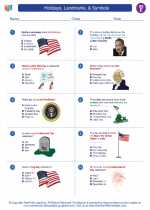
 Worksheet/Answer key
Worksheet/Answer key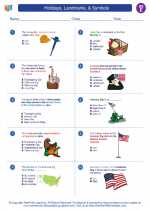
 Worksheet/Answer key
Worksheet/Answer key